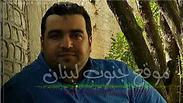
Jawad Nasrallah
Coded messages and money transfers: How Hezbollah recruits West Bank terrorists
A chat on Facebook with Nasrallah's son led to the recruitment of volunteers in Tulkarm and a plot to assassinate an IDF officer, thwarted by the Shin Bet. This is how Hezbollah tried to penetrate the heart of the Palestinian territories.
The operations of the Tulkarm terror cell exposed on Wednesday, which was directed by Hezbollah's Unit 133, can reveal much on the Lebanese terror organization's efforts to recruit Palestinian terror activists.
Jawad Nasrallah, son of Hezbollah Secretary General Hassan Nasrallah, made his first contact with the head of the Tulkarm cell, Mahmoud Jalloul, on Facebook in late August, with the Palestinian asking Nasrallah the younger to put him in contact with the Shi'ite organization.
While the two started communicating before the outbreak of the wave of terror attacks in October, security forces already started noticing first signs of sleeper cells in the West Bank, particularly in the Samaria area, rearing their heads.
Nasrallah Junior was cautious, and responded to Jalloul several days later with the request to wait patiently. Several days after that, Jalloul was contacted by Fadi Shmandar, another Hezbollah operative, who sent him an e-mail with files and an encryption software with instructions on how to use it.
The two encrypted their communication from then onwards. The Palestinian asked his Lebanese contact for money to finance the terror attacks he was planning. "You'll receive the money only after we become more acquainted," Shmandar responded.
After receiving an encrypted message to their phones or computers, Jalloul and the members of his cell quickly deleted the messages, but Israeli security forces were still able to intercept them.
Over weeks of caution and suspicion on Hezbollah's side, 16 encrypted messages were passed between Tulkarm and south Lebanon. These messages included instructions on how to commit terror attacks against the Jews, collecting intelligence on IDF training bases, cell members sending terror attack plans to Hezbollah for approval, and finding a Gaza resident to transfer the funds for the attacks.
The Shin Bet's investigation found that in one such communication Jalloul sent his Hezbollah handler a plan to assassinate an IDF officer. It included the officer's personal details and his photo. Jalloul stated he and his cell members are tracking the officer, and asked for $30,000 to buy weapons for the assassination. A friend of Jalloul advised him not to ask for exaggerated sums from the Shi'ite organization to show them he was trustworthy.
Several days later, Hezbollah responded to Jalloul's request with another coded message, confirming $25,000 will be transferred to the cell.
The plot was thwarted by the Shin Bet, and the cell only received $5,000 for its shooting attack, which they used to purchase a weapon and a cartridge with bullets. The money was transferred through a money transfer company from abroad to the West Bank, and the weapon was hidden in the home of one of the cell members.
The cell included five members, and they were also indicted for stone-throwing and hurling Molotov cocktails at security forces over the past year. Two of them have been imprisoned in Israel in the past.
According to the Shin Bet, these members are not affiliated with Palestinian terror organizations like Hamas, Fatah or the Islamic Jihad.
The fact their past activists "only" include popular terrorism acts, and their daring in initiating contact with Hezbollah in order to operate in the West Bank on the Lebanese organization's behalf, could indicate an escalation in the Palestinian street in its armed struggle against Israel.
Lone terrorists that despaired of the Palestinian Authority and even of Hamas now turn directly to those defined earlier this week by IDF Chief of Staff Gadi Eisenkot as Israel's main enemy.
The compartmentalization used by Hezbollah in the operations of this cell indicates that the organization is working hard to keep its actions hidden from IDF Intelligence.
In their press briefings, officials in Military Intelligence and in the IDF in general constantly remind reporters of Hassan Nasrallah's declarations about Israel, stressing that his threats should be taken seriously, and Israel should prepare for them accordingly. The speech in which Nasrallah promised to aid the Palestinian people could indicate that the Tulkarm terror cell would not be the last Hezbollah-backed cell in the territories.











